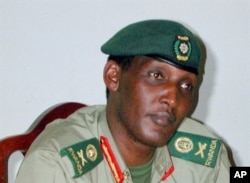Rwanda’s prosecutor general Martin Ngoga says allegations of repression made against his government are baseless.
Human rights organizations and critics say government repression has made it difficult for opponents of the ruling party and of President Paul Kagame to prevail in the up-coming presidential elections.
Ngoga, who is in the US this week, said the weak opposition can’t be blamed on the government. He says that the constitution and laws in Rwanda provide for “a level playing field…provided the laws governing the country are respected."
Observers say that the opposition has not been allowed to register and campaign for the presidency. Ngoga says that opposition figures like Victorie Ingabire were barred from registering their parties because they broke the law.
“She is a subject of a criminal process [procedure], which is of an international nature,” he says.
Ngoga was referring to a recent UN report connecting Ingabire and her political party, the Union of Democratic Forces [FDU] to the rebel Democratic Liberation Forces of Rwanda (known by its French acronym, FDLR].. The group has been classified by the UN and the US as a terrorist organization.
However he added that Ingabire “could have run as an independent candidate” for president.
In another matter, Ngoga denied any government involvement in the recent shooting of a dissident general exiled in South Africa, Kayumba Nyamwasa.
He maintains that Pretoria should extradite him to Rwanda to answer criminal charges, including recent grenade attacks in Kigali.
“He is a subject of indictment of our justice system…we believe that South Africa will go through their own legal processes, pursue domestic law and give us some conclusive response to this matter.”
However, he doesn’t support the Nyamwasa’s extradition to France. French judges wants to question him for alleged involvement in the shooting down of the plane carrying Rwanda’s ex-President Juvenal Habyarimana and his Burundian counterpart Cyprian Ntaryamira in 1994.
“The indictments by France and Spain are bogus,” he says, “and they should not be respected.”
